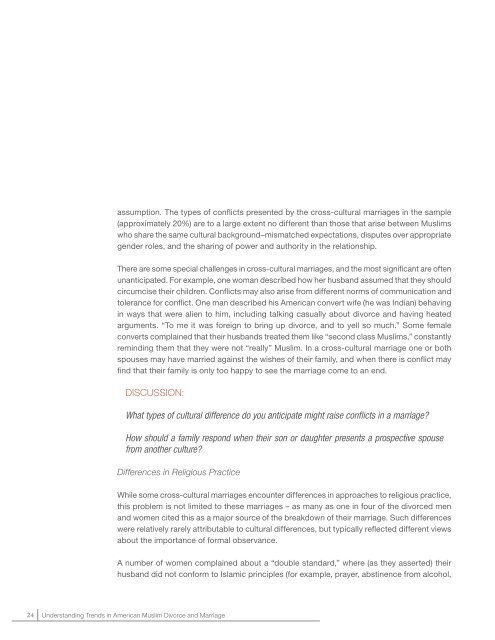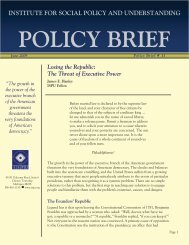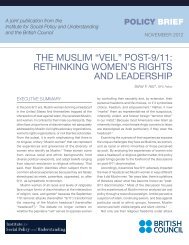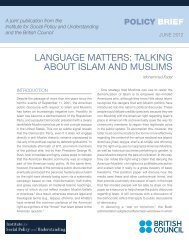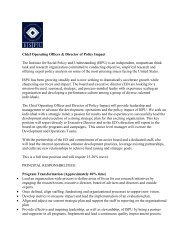Understanding trends in american mUslim divorce and marriage:
Understanding trends in american mUslim divorce and marriage:
Understanding trends in american mUslim divorce and marriage:
You also want an ePaper? Increase the reach of your titles
YUMPU automatically turns print PDFs into web optimized ePapers that Google loves.
assumption. The types of conflicts presented by the cross-cultural <strong>marriage</strong>s <strong>in</strong> the sample<br />
(approximately 20%) are to a large extent no different than those that arise between Muslims<br />
who share the same cultural background–mismatched expectations, disputes over appropriate<br />
gender roles, <strong>and</strong> the shar<strong>in</strong>g of power <strong>and</strong> authority <strong>in</strong> the relationship.<br />
There are some special challenges <strong>in</strong> cross-cultural <strong>marriage</strong>s, <strong>and</strong> the most significant are often<br />
unanticipated. For example, one woman described how her husb<strong>and</strong> assumed that they should<br />
circumcise their children. Conflicts may also arise from different norms of communication <strong>and</strong><br />
tolerance for conflict. One man described his American convert wife (he was Indian) behav<strong>in</strong>g<br />
<strong>in</strong> ways that were alien to him, <strong>in</strong>clud<strong>in</strong>g talk<strong>in</strong>g casually about <strong>divorce</strong> <strong>and</strong> hav<strong>in</strong>g heated<br />
arguments. “To me it was foreign to br<strong>in</strong>g up <strong>divorce</strong>, <strong>and</strong> to yell so much.” Some female<br />
converts compla<strong>in</strong>ed that their husb<strong>and</strong>s treated them like “second class Muslims,” constantly<br />
rem<strong>in</strong>d<strong>in</strong>g them that they were not “really” Muslim. In a cross-cultural <strong>marriage</strong> one or both<br />
spouses may have married aga<strong>in</strong>st the wishes of their family, <strong>and</strong> when there is conflict may<br />
f<strong>in</strong>d that their family is only too happy to see the <strong>marriage</strong> come to an end.<br />
Discussion:<br />
What types of cultural difference do you anticipate might raise conflicts <strong>in</strong> a <strong>marriage</strong>?<br />
How should a family respond when their son or daughter presents a prospective spouse<br />
from another culture?<br />
Differences <strong>in</strong> Religious Practice<br />
While some cross-cultural <strong>marriage</strong>s encounter differences <strong>in</strong> approaches to religious practice,<br />
this problem is not limited to these <strong>marriage</strong>s – as many as one <strong>in</strong> four of the <strong>divorce</strong>d men<br />
<strong>and</strong> women cited this as a major source of the breakdown of their <strong>marriage</strong>. Such differences<br />
were relatively rarely attributable to cultural differences, but typically reflected different views<br />
about the importance of formal observance.<br />
A number of women compla<strong>in</strong>ed about a “double st<strong>and</strong>ard,” where (as they asserted) their<br />
husb<strong>and</strong> did not conform to Islamic pr<strong>in</strong>ciples (for example, prayer, abst<strong>in</strong>ence from alcohol,<br />
24<br />
<strong>Underst<strong>and</strong><strong>in</strong>g</strong> Trends <strong>in</strong> American Muslim Divorce <strong>and</strong> Marriage


